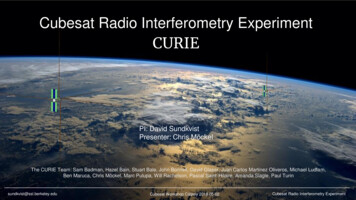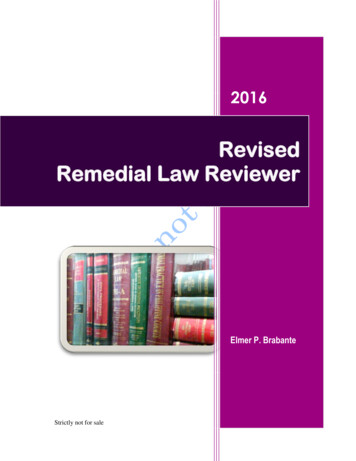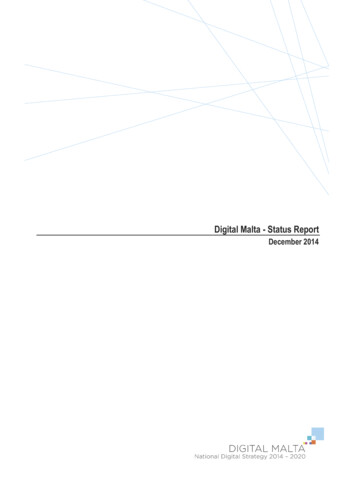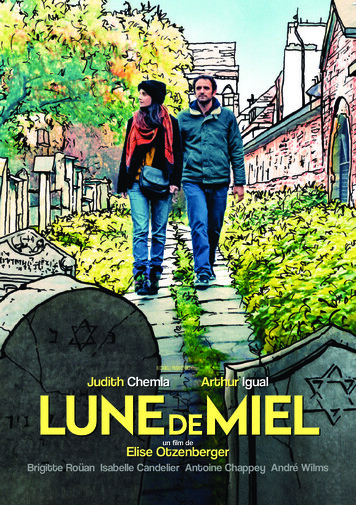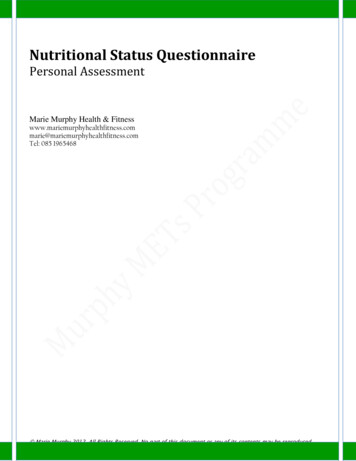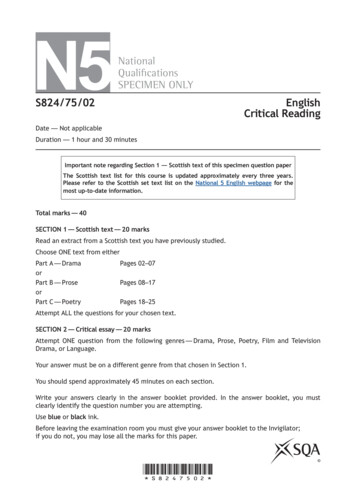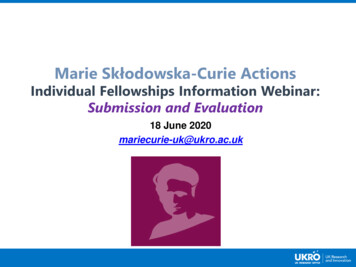
Transcription
Marie Skłodowska-Curie ActionsIndividual Fellowships Information Webinar:Submission and Evaluation18 June 2020mariecurie-uk@ukro.ac.uk
MSCA Individual Fellowships Overview Individual Fellowships 2020–Brief overview of the scheme–Submission Process–Evaluation Criteria–Proposal development tipsIndividual Fellowship Expert Evaluator Experience
Marie Skłodowska-Curie Actions (MSCA)Overview
Horizon 2020 StructureExcellentScienceEuropean ResearchCouncil (ERC)Future and EmergingTechnologies (FET)Marie SkłodowskaCurie Actions ocietalChallengesHealth and WellbeingLeadership inEnabling andIndustrialTechnologies (LEIT)- ICT, NMBP, SpaceAccess to RiskFinanceInnovation in SMEsFood securityTransportEnergyClimate actionSocietiesSecurityWidening Participation; Science with and for Society, Mainstreaming ofSocial Sciences and Humanities (SSH) and ICT, Fast Track to InnovationEuropean Institute ofInnovation andTechnology (EIT)EURATOMJoint Research Centre(JRC)
Marie Skłodowska-Curie Actions IndividualFellowships (IF)MSCA-IF-2020 Call
Key FeaturesIndividual grant for Experienced Researchers to support mobility, research projects and trainingIntersectoral: Opportunity to gain new knowledge in and outside academiaInternational: Opportunities both within and beyond EuropeDefined eligibility criteria but no nationality, age or career stage restrictionsResponsible Research and Innovation (RRI) approach to proposalsBeneficiaries and researchers must follow the European Code of Conduct for Research IntegrityWorking conditions in line with The European Charter for Researchers and The Code of Conduct forRecruitment as outlined in the Information package for Marie Skłodowska-Curie Fellows
Individual FellowshipsEuropeanFellowships(12-24 months)Global Fellowships(12-24 months) (12 month returnphase)MS/ACMS/ACThird CountryoutgoingMS/ACreturnAny CountryFrom any country to MS/ACMust not have lived 12 months oflast 36 months in that MS/ACStandard PanelSociety andEnterpriseCareer RestartPanel (CAR)ReintegrationPanel (RI)MS/AC citizen/long term resident toThird Country plus mandatoryreturn phase in any MS/ACMust not have lived 12 months oflast 36 months in that third countryGlobal Fellowships Panel
Proposed Budget A country correction coefficient (CCC) applies to living allowance (MSCA WorkProgramme) For Global Fellowships there will be two different country correctioncoefficients Living Allowance is the GROSS amount Mobility and Family Allowance (were applicable) can also be subjected totaxation Eligibility to receive family allowance is determined at the call deadline (9 Sept2020)
Call TimelineActionDateInvitation to Submit ProposalDeadline for SubmissionEvaluation of Proposals9 September 202017:00 Brussels TimeOctober - December 2020Information on Outcome ofEvaluationsIndicative Date for Signing the GrantAgreementProspective Start Date8 April 2020February 2021February - March 2021March 2021 - September 2022Submit Early, Submit OftenCommission collects proposals at Deadline
Application ProcessMSCA-IF-2020 Call
Approaching Proposal SubmissionRegister in the Funding & Tender Opportunities Portal and create an ECAS accountGet in touch with the research support office at your host institutionAdd relevant contact people to the online applicationSubmit early and often – latest version will be acceptedKeep the Guide for Applicants in front of you!!!Call Name: Marie Skłodowska-Curie Individual Fellowships Call ID:H2020-MSCA-IF-2020
Who Submits the ApplicationUnder call H2020-MSCA-IF-2020, topic MSCA-IF-2020, why should a researcher notsubmit the proposal on his/her own? The legal responsibility lies with the host organisation in a Member State or Associated Country (futurebeneficiary) Only the supervisor, can act on behalf of the organization until the Grant Agreement is signed Only the supervisor should press the "submit" button and take any other actions in the name of theorganisation until the Grant Agreement is signed The electronic submission system allows the researcher to submit the proposal He/she should consider the implications of this carefully before doing so
SubmissionPart B: Templateavailable to downloadParts B: PDF to beuploaded
Part A – Administrative Forms Annex 3 – How to completethe Proposal SubmissionForms (Part A) of theproposal
2 - Administrative data of participating organisations Supervisor Researcher
5 - Call specific questionsStandard FellowshipGlobal Fellowship
Where do you add Partner Organizations?Global Fellowships: Step 4 PartiesSecondments: Section 5Both: Part B2 Section 5 - Capacity of the Participating Organisations
Part B - The ProposalMin. font size 11 *The page formattingwill besystematicallychecked by theREA.All margins at least15 mmTables are only forillustrating the coretext of the proposal.Footnotes are forliterature referencesONLY.Information providedthrough hyperlinkswill be disregarded.(Should not contain thecore text itself)* Except for the Gantt chart, tables and footnotes (min. font size 8)
Part B – What does it Include?TemplatesPart B1Part B2 Make sure you download the2020 Templates Include all mandatory tables Respect the page limits No overall page limit (butindicative lengths for thedifferent sections) Section 4: CV of the Fellow Section 5: Capacities of theparticipating organisations Section 6: Ethics Section 7: Letter of commitment(for GF only)Max length is 10 pagesSection 1: ExcellenceSection 2: ImpactSection 3: Implementation
Letter of CommitmentONLY for partnerorganisations in a thirdcountry hosting theoutgoing phase of aGlobal FellowshipThe letter must be upto-date and on headedpaperGeneral guidelines aregiven – no templateIt should confirm realand active participationin the proposed actionThey can take time toget signedGlobal Fellowship proposals which fail to include a letter ofcommitment of the partner organisation will be declared inadmissible
Evaluation CriteriaMSCA-IF-2020 Call
Evaluation CriteriaExcellence (50%)Quality and credibility of theresearch/innovation project; level ofnovelty, appropriate considerationof inter/multidisciplinary and genderaspectsQuality and appropriateness of thetraining and of the two way transferof knowledge between theresearcher and the hostQuality of the supervision and of theintegration in the team/institutionImpact (30%)Implementation (20%)Enhancing the future careerprospects of the researcherafter the fellowshipCoherence and effectiveness of thework plan, including theappropriateness of the allocation oftasks and resourcesQuality of the proposedmeasures to exploit anddisseminate the project resultsAppropriateness of the managementstructure and procedures, including riskmanagementQuality of the proposedmeasures to communicate theproject activities to differenttarget audiencesAppropriateness of the institutionalenvironment (infrastructure)Potential of the researcher to reachor re-enforce professionalmaturity/independence during thefellowshipWeighting (Priority in case of proposals with the same score (ex aequo)123
Excellence 1.1 Quality and credibility of the research/innovation project; level of novelty,appropriate consideration of inter/multidisciplinary aspects and gender aspects Have clear, focused research objectives and provide overview of the projectMake it clear why the project is novel, ground breaking or cutting edge (in the context of the upto-date state-of-the-art);Detail the planned methodology and approachHighlight the impact of the project - how will it advance the research fieldHighlight all inter- and multidisciplinary aspectsDetail gender aspects relevant to the research content (where appropriate)Explain how the project will open up career and collaboration opportunities1.2 Quality and appropriateness of the training and of the two way transfer of knowledgebetween the researcher and the host Two way interaction (transfer of knowledge) between the research and the host (and partnerorganisiaons if application)Training-through-researchThe research project makes up the focus of the Fellowship, but should be framed in the contextof training for the researcherIn particular, in terms of multi/interdisciplinary expertise, intersectoral experience andtransferable skillsOther training examples include: financial management; communication/outreach skills; anddevelop expertise in IPRGlobal Fellowships, identify how the skills/knowledge gained will be transferred back to EU Host
Excellence con’t 1.3 Quality of the supervision and of the integration in the team/institution––––– Qualifications and experience of the supervisor(s)Include evidence that the supervisor is suitably qualified/experienced to ensure the success of theFellowship on the research topic (e.g. participation in projects, publications, patents, relevant results,international collaborations and no. postdocs/PhD students mentored etc.)If other colleagues will provide mentoring, describe it.Hosting arrangements - include the measures to ensure the successful integration of the Fellow andtransfer of knowledge/skills (e.g. is there an institutional Research Development Strategy, consider whatthe Career Development Plan would look like etc.).For Global Fellowships describe both phases and their interconnectivity1.4 Capacity of the researcher to reach and re-enforce a position of �Show that the candidate has an excellent track record given their career status (e.g. publications,patents, conference papers, chapters, monographs)Highlight all relevant experiences, including teaching, supervision, or work with industry/non-academicpartners;Use the CV for reference to help with space, but bring out and detail major relevant achievements;Clearly demonstrate that the researcher is right for the Fellowship project and that they will develop andgrow during the trainingExplain how the Fellowship will have an enormous positive impact on the researcher’s career (e.g. attainleading independent position or resuming research career after a break)Demonstrate the capacity for independent thinking and leadership
Impact 2.1 Enhancing the potential and future career prospects of the researcher– Detail the expected impact of the Fellowship (training and research) on the researcherscareer after the Fellowship– What are the researcher’s professional goals and how will the Fellowship contribute to them Development of new skills, including those which are transferable; New experiences in new sectors through secondments, for example;– Specify new competences that will be acquired (‘better trained and entrepreneurialresearcher’).– Explain how this will all be achieved throughout the project 2.2 Quality of the proposed measures to exploit and disseminate the action results– Concrete planning for dissemination and exploitation should be included in the Gantt Chart.– Explain how Dissemination feeds into Exploitation– Ensure dissemination of results are appropriately targeted to peers, e.g. scientific or industrycommunity.– Describe the planned dissemination and exploitation activities - How will research results betransferred to potential users, scientists, society?– If appropriate, present commercialisation plans, consider IPR arrangements
Impact 2.3 Quality of the proposed measures to communicate the project activities todifferent target audiences– Prepare a detailed communication strategy and timeline (include in the Gantt Chart) – tocreate awareness of the performed research– Have clear communication goals, objectives and defined audiences– Use the right medium and means, if possible use dissemination partners and multipliers– Go beyond the ‘obvious’ – what’s the relevance to citizens’ everyday lives?– How will the Fellowship contribute to a European ‘Innovation Union’ accounting for publicspending?– Don’t forget the European Researchers’ NIGHT events (September every year)– EC Communicating Your Project and Communicating EU research and innovation guidancefor project participants
Implementation 3.1 Coherence and effectiveness of the work plan, including appropriateness of theallocation of tasks and resources––––– Explain how the work plan and resources mobilised will ensure successExplain why the amount of person-months is appropriate to achieve the objectivesWork Packages can be included for all activities, i.e. research, management, training.The Work Plan should be clear and realistic and show how the desired impacts will be achieved;Include the Gantt Chart specified in the application3.2 Appropriateness of the management structure and procedures, including riskmanagement– Describe the organisation and management structure in place, including progress monitoringmechanisms, to ensure success– What research/administrative risks might endanger the success of the project and what are theplanned contingencies/mitigation measures (incl. support from HR or European offices)– For entities with a capital or legal link to the beneficiary, what is their involvement and how willorganisation/management and risk mitigation be addressed with them
Implementation 3.4 Appropriateness of the institutional environment (infrastructure)– Describe the infrastructure, logistics, facilities that will be available to the researcher andnecessary to ensure the successful implementation of the project.– Describe the active contribution of the beneficiary and partners (if appropriate) to theproposed research and training activities– Why is it an appropriate place to conduct the Fellowship– Do they have experience in the research field/hosting Fellows– Demonstrate commitment by providing the researcher with that needed to successfullycomplete the Fellowship– Global Fellowships: Similar description for the outgoing third country host
Proposal AdviceMSCA-IF-2020 Call
Key pointsProposal AdviceThis is the supervisor (PI) grantBoth the PI & the Fellow are involved in writing the proposalFellow should have a strong CV (in relation to their career stage)Read all call documentation and the evaluation criteriaConsider any relevant EU policy documentsMake it easy for the evaluators to find the informationEvaluators will be experts, but not necessarily in your exact areaUse clear and concise languageExplain country/research area specific jargonInclude diagrams, images, tables if appropriateMeet your planned supervisor/fellow (virtual or otherwise)Research previous and current projectsFind colleagues to proof read drafts with the evaluation criteriaBest proposals have input from Fellow, Supervisor andHost intuitionThe proposal will take time to write
Key pointsEvaluator CommentsEvaluators are expertise - but a larger audience than in atypical scientific seminar you would present atExpect proposals on a whole to address all the criteriaThink beyond the science – identify the Fellows trainingneedsGet the science AND the training rightTwo-way transfer of knowledgeThe supervisor and the fellow need to comment time andenergy to the project and proposal developmentImportant that the application is a co-production betweenthe supervisor, the Fellow and the research institutionTables and diagrams can be helpful in theimplementation section – but they need to be clearGet someone unrelated to the project to read it through tomake sure it is clear
Read the Guide For ApplicantsThe Guide for Applicants is crucial – don’t let itout of your sight!It provides all eligibility criteria, proposal structureand financial rulesGives assessment criteria and process overview
Additional Information MSCA 2018-2020 Work Programme 2020 Guide for Applicants MSCA 2020 Call – Funding & Tender Opportunities Portal NET4Mobility Network of MSCA NCPs–Handbook for 2020 Individual Fellowship–Individual Fellowship Webinar H2020 Annotated Model Grant Agreement Marie Curie Alumni Association EURAXESS EURAXESS REFEX (Career Development App)
Thank you!
Register in the Funding & Tender Opportunities Portal and create an ECAS account Approaching Proposal Submission Call Name: Marie Skłodowska-Curie Individual Fellowships Call ID:H2020-MSCA-IF-2020 . - How will the Fellowship contribute to a European 'Innovation Union' accounting for public spending? - Don't forget the European .
